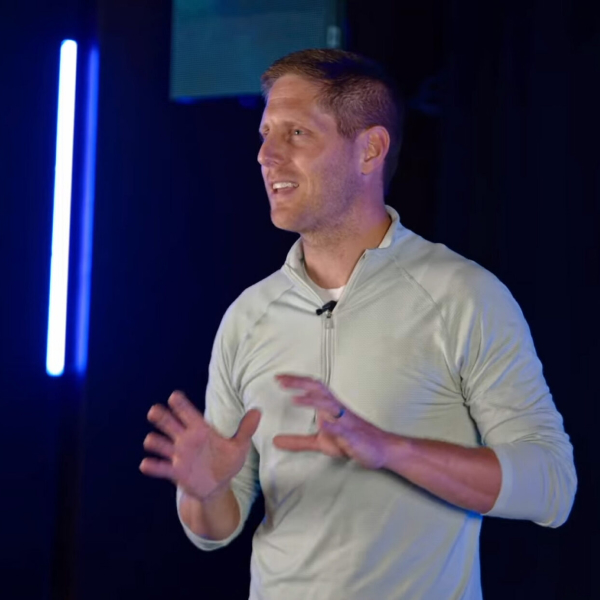To many, mindsets are a fluffy concept dealing with our state of mind.
While few would say that mindsets are unimportant, the reality is that few people take mindsets as seriously as they should.
The reason why we should take mindsets more seriously is because they are truly foundational to everything we do. This becomes clear when we understand two things:
- The Cognitive-Affective Processing System (CAPS) Framework – One of the best psychological frameworks that explains why we do what we do
- The three foundational jobs our mindsets play in our lives
CAPS Framework
Common Perspective
The most common belief for why people do what they do is: We do what we do because of the personality, skills, talents, goals, and values that we have.
To put this in the language of the CAPS Framework, the various elements of our personality system drives how we behave, as indicated in the figure below: 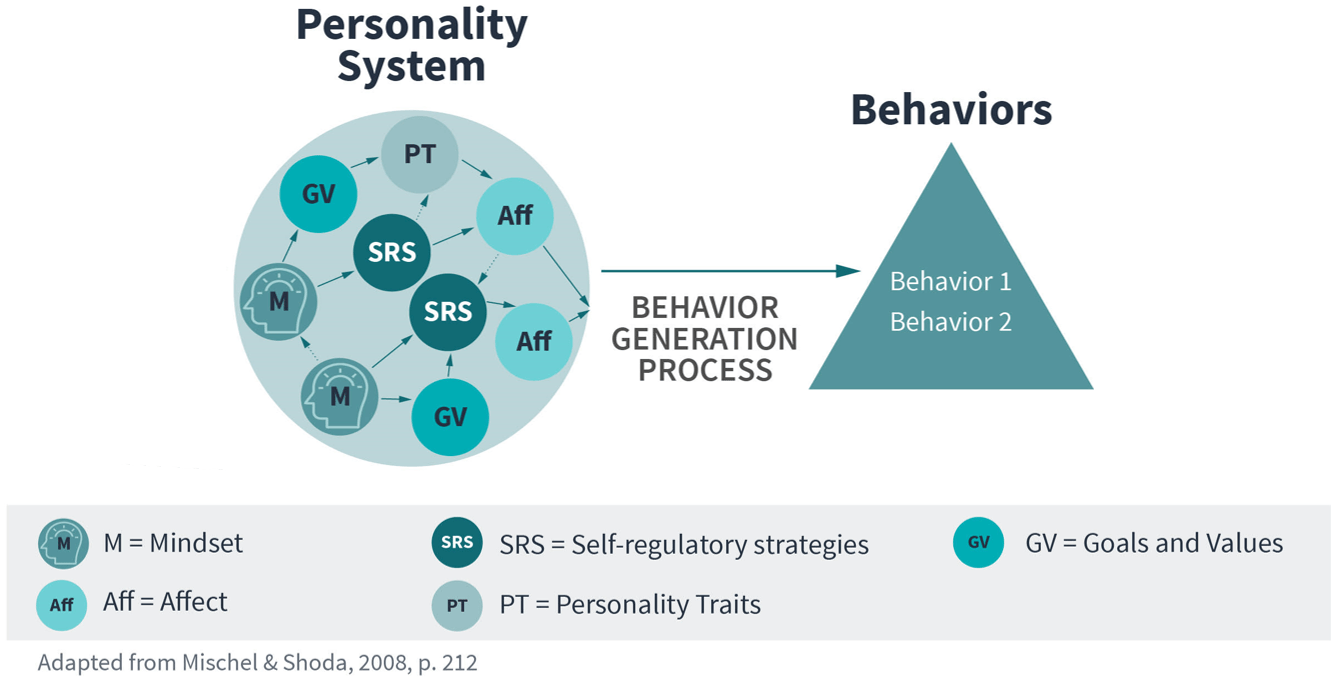
There is an implication and an assumption associated with this belief:
- Implication: If we want to improve someone’s behaviors (i.e., get them to perform at a higher level), we need to upgrade various elements of their personality system.
- Assumption: When people possess a certain personality trait, skill, talent, etc., they will manifest that trait, skill, and talent in a similar fashion across the various situations that they encounter.
- For example, if someone is an introvert, they will act introvertedly across the situations they encounter.
More Accurate Perspective
But, is this a complete perspective for why people do what they do? No.
The reality is more complex than that. If someone is an introvert, they don’t demonstrate the same level of introversion across the different situations they encounter.
Thus, a huge element that is missing thus far from what I have presented of the CAPS Framework is the situations we encounter.
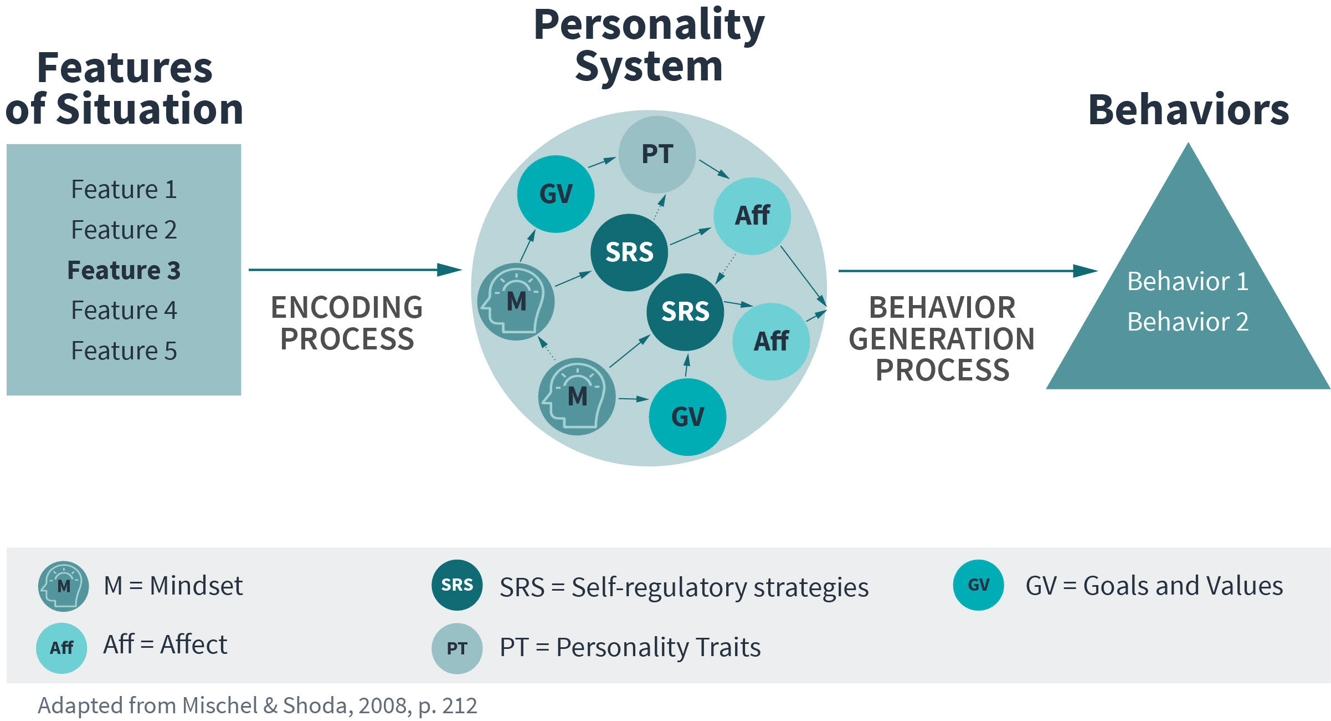
The full CAPS Framework suggests that why we do what we do can be explained by the combination of (1) the features of the situation and (2) our personality system.
More specifically, the CAPS Framework suggests that:
- Depending upon the cues of the situation
- And how we interpret them
- Activates different elements of our personality system to best navigate that situation based upon the situational cue absorbed and how they are interpreted.
This explains why:
- When an introvert goes to a party with a bunch of close friends and family members (cues) and interprets as being a safe environment, it activates less of his introversion and more of his extraversion, causing him to behave extrovertedly.
- But when an introvert goes to a party with a bunch of strangers (cues) and interprets as being less safe, it activates more of his introversion, causing him to behave more introvertedly.
Encoding Processes
When we understand this, a factor jumps out at us as being critical and foundational for explaining why we do what we do: our encoding processes.
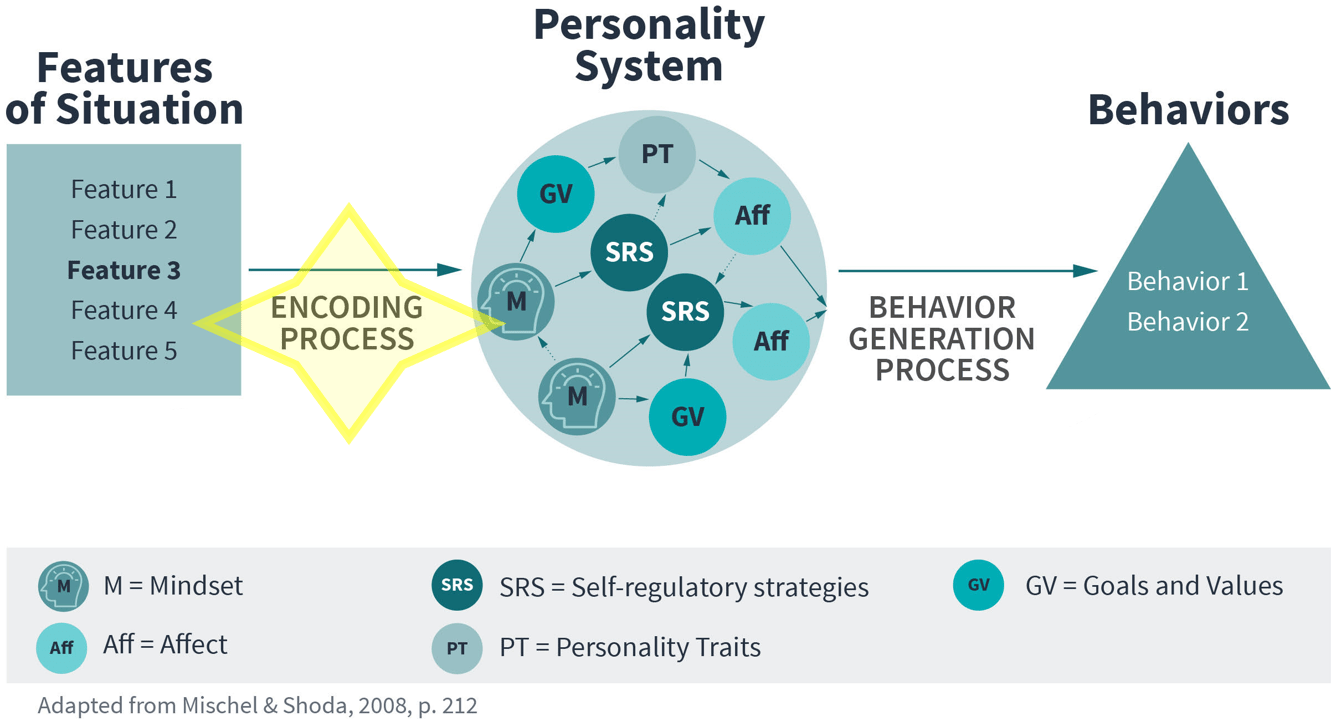
Our encoding processes are an element about ourselves that is the linchpin that connects us to our situation.
They serve three primary roles:
- Because our body sends 11 million bits of information per second to our brain and our brain can only consciously process 50 bits of information per second, our encoding process plays the important job of filtering in the information deemed most important.
- Our encoding process interprets that filtered information in unique ways.
- Based upon the information absorbed and how it is interpreted, our encoding process activates different aspects about our personality system (e.g., personality, skills, self-regulatory strategies) so that we can best navigate the situations we encounter based on our encoding process-fueled interpretations.
There are a couple of things that are unique about our encoding processes:
- For the most part, we are not conscious of our encoding processes (i.e., how we encode our world).
- Our encoding processes shape 90% of our thinking, feeling, judging, and acting.
Thus, most of what we do can be explained by our nonconscious automatic encoding processes.
3 Foundational Jobs of Mindsets
So, where do mindsets come into all of this?
Our mindsets are our encoding processes. They are mental fuel filters that serve three foundational jobs in why we do what we do:
- Filter: Our mindsets filter in information into our brain that our mindsets deem most important
- Interpret: Our mindsets interpret this filtered information in unique ways
- Activate: Based upon the information filtered in and how it is interpreted, it will activate different elements of our personality system
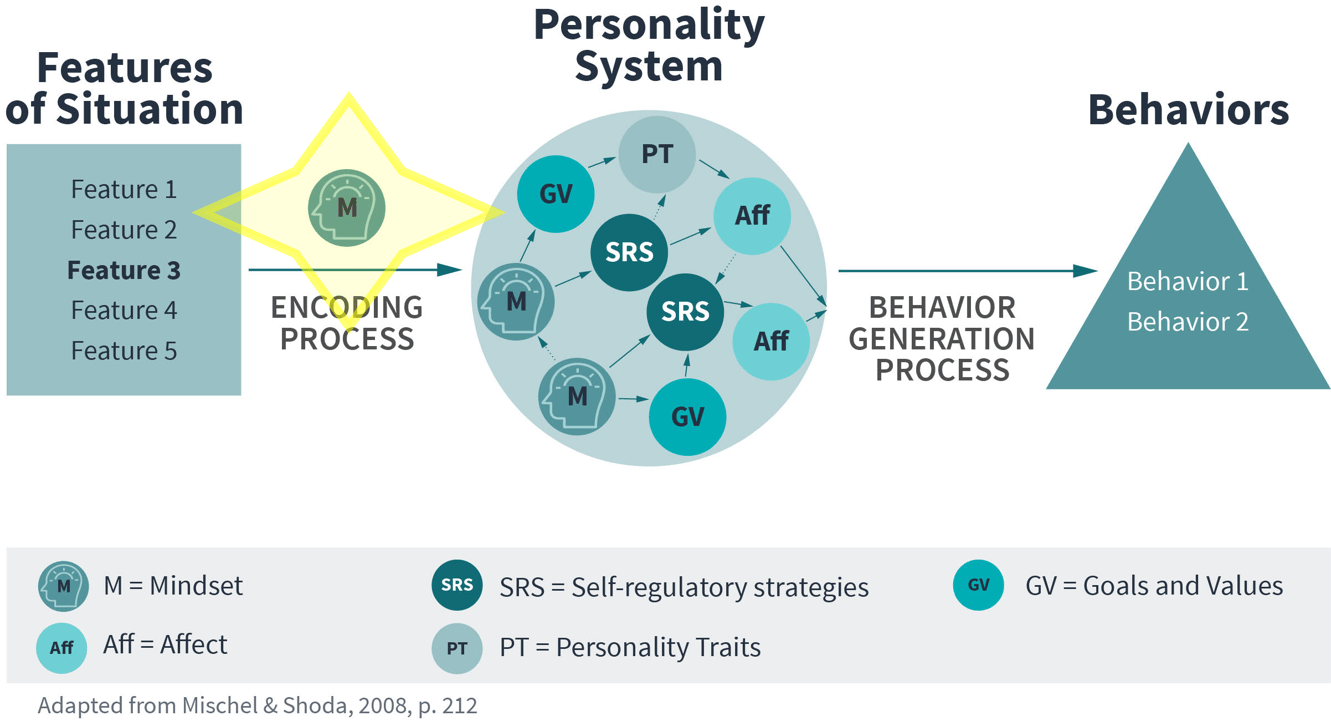
Example
Let’s consider two ship captains, one who has a prevention mindset (programmed to avoid losses) and another who has a promotion mindset (programmed to seek wins).
In their environment, there are thousands of situational cues, some of which include:
- Sharks circling in the water
- Birds flying overhead
- A storm approaching on the horizon
- The large size of the ship he is on
The captain with a prevention mindset is likely going to filter in the following pieces of information and will interpret them as follows:
-
- Storm on the horizon – will see it as a threat
- Sharks circling in the water – will see them as a threat and reinforce the idea that he cannot let the boat sink
- This will cause the captain to activate self-protection mechanisms in his personality system driving him to move away from the storm.
The captain with a promotion mindset is likely to filter the following pieces of information and will interpret them as follows:
-
- Storm on the horizon – will see it as a challenge to navigate through
- The large size of the ship he is on – Confidence to be able to take on the storm
- This will cause the captain to activate advancement mechanisms in his personality system driving him to approach the storm in an effort to get to his definition.
Our Mindsets are Foundational to Who We are and What We Do
Until reading this, you likely valued mindsets, but also underappreciated the foundational role that they play in your life.
When we understand the CAPS Framework and the three foundational jobs our mindsets play in our lives, we learn that our mindsets are truly the most foundational element about ourselves, they serve as the linchpin between the situations we encounter and how we operate in those situations.
And, while most of us are unconscious of our mindsets, we can become conscious of them. And, when we become conscious of them, we become able to improve them if needed.
Across the 10,000+ people who have taken my mindset assessment, only 5% are in the top quartile across the four sets of mindsets that it assesses. This suggests that, for most of us, if we can awaken to our mindsets and develop more positive mindsets, we can improve ourselves at our most foundational level, leading to improvements in our thinking, learning, and behavior; and consequently, our success across our life, work, and leadership.
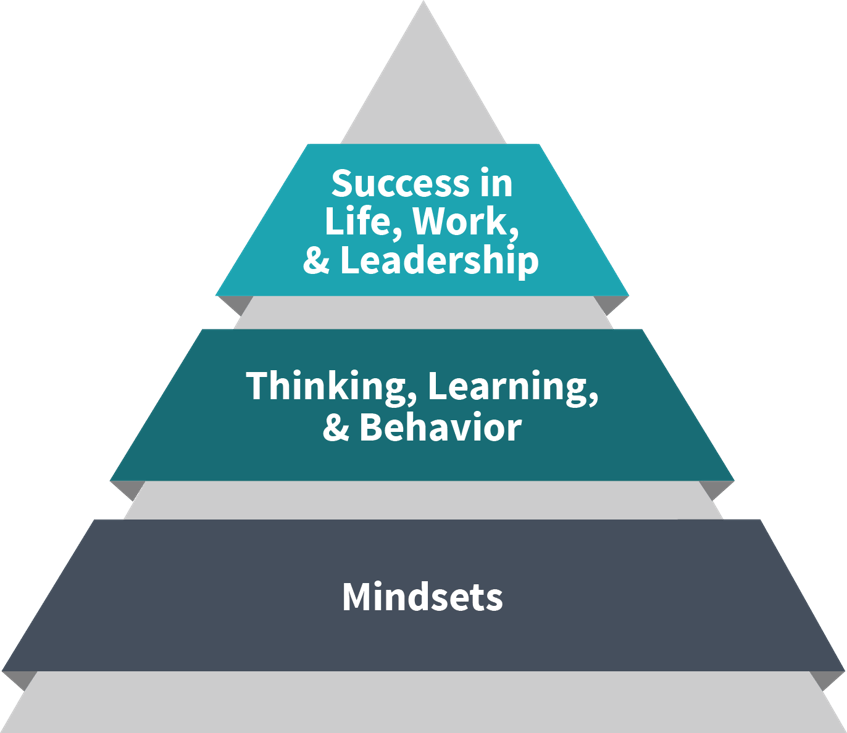
What’s Next
If you want to assess the quality of your mindsets, take my FREE Mindset Assessment:
If you want to work on and develop more positive mindsets:
1. Check out my Wall Street Journal and USA Today best-selling book: Success Mindsets: Your Keys to Unlocking Greater Success in Your Life, Work, and Leadership.
2. Enroll in my Digital Mindset Coach – a 3-4 month program specifically tailored to help you systematically develop more positive mindsets.
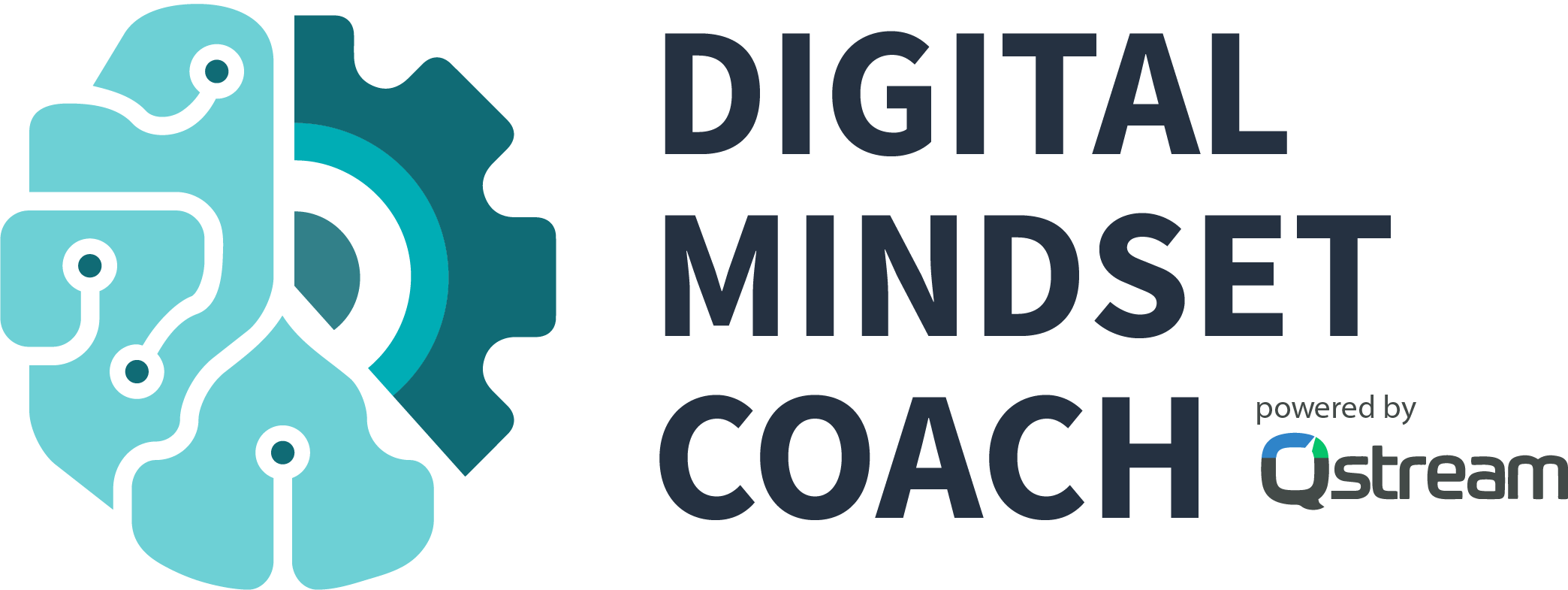
4. Watch this webinar: 3 Steps to Uncovering a Major Blind Spot that Could Be Sabotaging Your Life
3. Enroll in my High Octane Mindsets online course – a seven week course that is the deepest, most comprehensive, and most research-backed mindset course ever created, all designed to help you get unstuck and transform your life to make your goals and dreams a reality.












